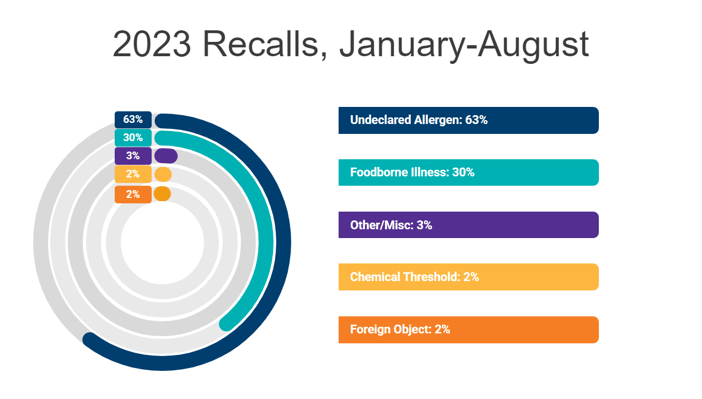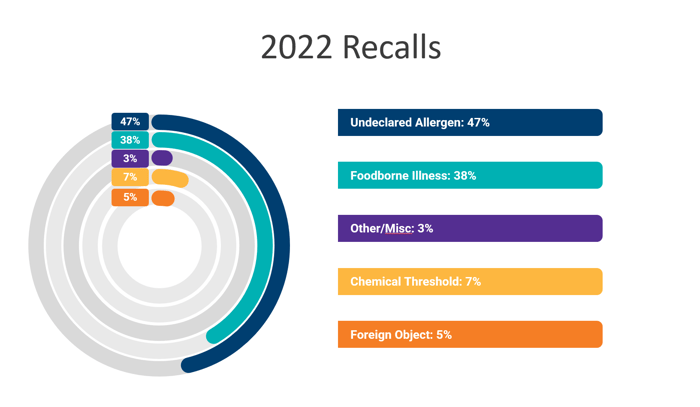[ad_1]
Remembers might be brought about for plenty of causes, and for a lot of remembers which can be newsworthy, foodborne sickness outbreaks are sometimes on the coronary heart of the problem. However a whole bunch of remembers occur yearly – a quantity that’s rising as expertise improves to catch these points early – and plenty of of these remembers by no means make headlines.
In truth, Trustwell carried out a brief unbiased audit of FDA Class I Remembers posted on their Remembers, Market Withdrawals, and Security Audits web site in each 2022 and 2023 (January-August). Are you able to guess what the main explanation for remembers was? Surprisingly, Undeclared Allergens made up the most important proportion of remembers total, making up 47% of all remembers in 2022 and 63% of remembers in 2023, up to now.


Whereas all these remembers could also be much less publicized than these involving foodborne sickness, the repercussions and price of the recall can nonetheless be simply as devastating. For shoppers with critical meals allergy symptoms, unintentionally ingesting an allergen can result in critical sickness or dying. For meals firms, remembers of any kind can value firms upwards of $10 million or extra in misplaced stock, non-compliance charges, authorized charges, and extra.
Why Undeclared Allergens Trigger So Many Remembers
The FDA considers meals allergens to be a serious meals hazard, which is why they’ve applied strict pointers on how one can label and correctly declare allergens on a product label. For U.S. shoppers with a meals allergy, even a minor presence of an allergen can result in critical sickness, anaphylactic shock, or dying. Based on the FDA, any presence of an allergen, together with protein derived from allergens (for instance, sodium caseinate derived from milk), should be declared clearly on product labels.
As of 2023, there are 9 allergens that meals firms should declare on a meals or complement product label meant for U.S. shoppers: milk, eggs, fish, shellfish, tree nuts, peanuts, wheat, soybeans, and sesame.
Sesame was the most recent allergen to be added to the record – firms had two years to conform by January 2023 – which could possibly be one purpose why undeclared allergen remembers are on the rise this yr. Nonetheless, additionally it is seemingly that packaging errors as a result of provide chain shifts and shortages, which have been frequent over the previous few years, are resulting in some producers not precisely documenting when provider substances have been up to date.
The variety of remembers as a result of undeclared allergens have been excessive for a number of years, because the FDA’s allergen rules are strict. Firms that miss an allergen ingredient, or improperly format a declaration will seemingly see a recall down the road.
Allergen Labeling Mishaps
The FDA’s pointers on labeling allergens are clear: any presence of an allergen in a meals or ingredient should be declared on a label. Nonetheless, the FDA gives little steering on precautionary allergen labeling. Some firms might discover confusion right here, as together with a voluntary allergen assertion corresponding to “produced in a facility with (allergen)” is non-compulsory and never required by FALCPA rules. Nonetheless, the FDA is evident on one factor: voluntary statements shouldn’t be utilized in substitute of implementing good manufacturing practices.

As firms have adjusted to the sesame allergen labeling requirement, the FDA has additionally needed to make a press release a few new situation. NPR just lately highlighted that buyers with sesame allergens are discovering it tougher to keep away from sesame, regardless of the allergen legislation. NPR shared: “This is because of an unintended consequence that neither regulators nor folks with a sesame allergy noticed coming: Massive industrial bakers started including sesame, typically within the type of sesame flour, to merchandise that had by no means contained it earlier than.” NPR notes that is seemingly as a result of industrial bakers opting to not set up a separate, sesame-free manufacturing line, however to as an alternative adjust to the regulation with out investing in a extra expensive possibility.
However the FDA discourages this transfer. FDA Commissioner Dr. Califf just lately shared this assertion in an FDA replace:
“We have now turn out to be conscious of a apply with an end result we don’t help. Some producers are deliberately including sesame to merchandise that beforehand didn’t comprise sesame and are labeling the merchandise to point its presence. This retains producers in compliance with our legislation for disclosing the presence of a serious meals allergen, however limits choices for shoppers who’re allergic to sesame.
“With the passage of the FASTER Act, the FDA and households with sesame-allergic members hoped that it will turn out to be simpler for these allergic to sesame to really feel extra assured of their meals selections with the clear label declaration of sesame as a serious meals allergen. I don’t suppose anybody envisioned there being a lower within the availability of merchandise which can be secure selections for sesame allergic shoppers.”
You’ll be able to hear extra about this subject in our latest Transparency Speak podcast episode protecting the most recent rules within the trade.
Keep away from Undeclared Allergens with Coaching and Tech-Enabled Options
Data is commonly the most effective treatment for avoiding undeclared allergens, and tech with built-in checks and balances might help your organization carry out due diligence when guaranteeing compliance.
You’ll want to educate staff – everybody from formulators and label makers to these working alongside your provide chain – concerning the significance of precisely declaring allergens on meals product labels and avoiding cross-contact. Frequently speaking allergen requirements with suppliers may also assist your companions down the road keep compliance along with your meals security requirements.
At Trustwell, we perceive the significance of clear and correct product labeling. Our Genesis labeling suite presents options like automated allergen declaration checks that will help you keep compliance with allergen labeling and never miss an important declaration.
Plus, our FoodLogiQ suite helps firms streamline communication throughout their provide chain, that will help you higher handle and monitor provider compliance, important communication, and documentation.
To be taught extra about our suite of options and the way Trustwell might help your organization keep away from allergen noncompliance, join with our crew at this time.
[ad_2]
Source link




















